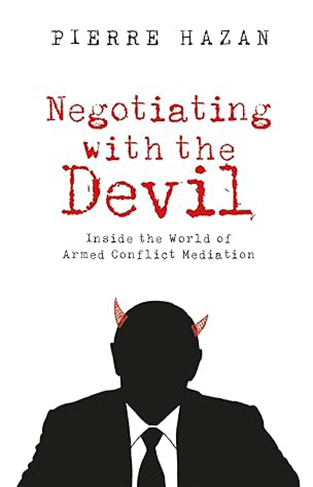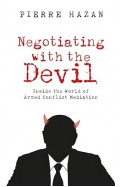Negotiating with the Devil - Inside the World of Armed Conflict Mediation
By: Pierre Hazan
-
Rs 4,091.75
- Rs 6,295.00
- 35%
You save Rs 2,203.25.
Due to constant currency fluctuation, prices are subject to change with or without notice.
After many years in the little-known world of back-channel mediation, helping sworn adversaries to prevent, manage or resolve conflict, Pierre Hazan felt compelled to re-examine the acute practical and ethical dilemmas that affected his work in Bosnia, Ukraine, the Sahel and the Central African Republic. What is the mediator’s responsibility when two belligerents conclude a peace agreement to the detriment of a third? Should mediators never be party to ‘ethnic cleansing’, even if it saves lives? Is a fragile peace worth sacrificing justice for―or will that sacrifice fuel another cycle of violence?
In an increasingly dystopian world, Negotiating with the Devil offers both practical guidelines and a moral compass for mediators whose field of action has transformed dramatically. We have gone from soft to hard power; from ‘peace dividends’ to war in Europe; from the end of one Cold War to a new East–West confrontation in Ukraine; from Pax Americana to a multipolar world; from the dream of an all-powerful UN to the organisation’s marginalisation. Against this tapestry, Hazan sheds light on the complex work of those steering peace negotiations, blending vivid first-hand observation with sharp insights into the psychology of compromise as a first step towards peace.
After many years in the little-known world of back-channel mediation, helping sworn adversaries to prevent, manage or resolve conflict, Pierre Hazan felt compelled to re-examine the acute practical and ethical dilemmas that affected his work in Bosnia, Ukraine, the Sahel and the Central African Republic. What is the mediator’s responsibility when two belligerents conclude a peace agreement to the detriment of a third? Should mediators never be party to ‘ethnic cleansing’, even if it saves lives? Is a fragile peace worth sacrificing justice for―or will that sacrifice fuel another cycle of violence?
In an increasingly dystopian world, Negotiating with the Devil offers both practical guidelines and a moral compass for mediators whose field of action has transformed dramatically. We have gone from soft to hard power; from ‘peace dividends’ to war in Europe; from the end of one Cold War to a new East–West confrontation in Ukraine; from Pax Americana to a multipolar world; from the dream of an all-powerful UN to the organisation’s marginalisation. Against this tapestry, Hazan sheds light on the complex work of those steering peace negotiations, blending vivid first-hand observation with sharp insights into the psychology of compromise as a first step towards peace.
Negotiating with the Devil - Inside the World of Armed Conflict Mediation
By: Pierre Hazan
Rs 4,091.75 Rs 6,295.00 Ex Tax :Rs 4,091.75
Zubin Mehta: A Musical Journey (An Authorized Biography)
By: VOID - Bakhtiar K. Dadabhoy
Rs 472.50 Rs 1,050.00 Ex Tax :Rs 472.50
The Facebook Effect: The Real Inside Story of Mark Zuckerberg and the Worlds Fastest Growing Company: The Inside Story of the Company That is Connecting the World
By: David Kirkpatrick
Rs 2,840.00 Rs 3,550.00 Ex Tax :Rs 2,840.00
The Hermitage Collections
By: Oleg Yakovlevich Neverov
Rs 25,346.25 Rs 33,795.00 Ex Tax :Rs 25,346.25
No similar books from this author available at the moment.
No recently viewed books available at the moment.
Zubin Mehta: A Musical Journey (An Authorized Biography)
By: VOID - Bakhtiar K. Dadabhoy
Rs 472.50 Rs 1,050.00 Ex Tax :Rs 472.50
Negotiating with the Devil - Inside the World of Armed Conflict Mediation
By: Pierre Hazan
Rs 4,091.75 Rs 6,295.00 Ex Tax :Rs 4,091.75













-120x187.jpg?q6)













